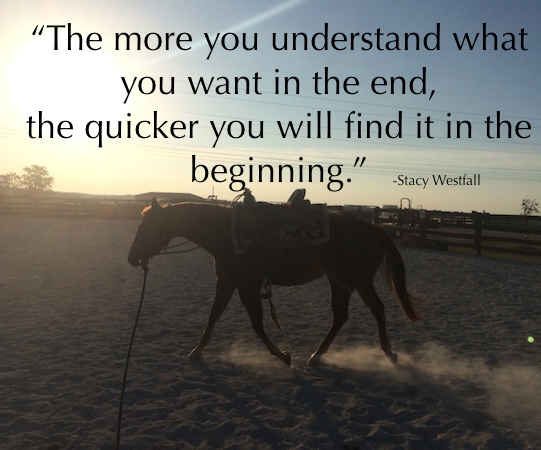I love starting colts. They tend to be open minded like small children who are eager to learn and they don’t have preconceived ideas about what is wanted from them. To make things even more exciting the progress is easy to measure; one day they have never been saddled, the next day they have…never been ridden, now they have been.
Finishing a horse is a much slower process. The changes are so small that they are hard to measure. Training a horse to respond consistently to a subtle shift or slight hand movement is often such a refined process that watching the training happen is like watching paint dry. Gone are the large leaps in training replaced by nearly undetectable changes. Sometimes to the uneducated eye it even appears that nothing is changing, but it is. Just ask the marketplace, the value of a well trained horse is often five to twenty five times the value of an untrained or poorly trained one.
This is why it is so valuable to have a well trained lesson horse around. The fastest way to improve a rider is to have them ride a horse that is responsive and well trained. This not only gives the rider confidence but allows them to ‘feel’ the end result of good training. Having this experience greatly increases the likelihood that in the future this rider will pass this ‘feel’ on to another horse.
Contrast this with the idea of a rider who has never ridden a well trained horse. Do you think they will improve each horse they ride? Are they as likely to reward the good quickly if they have never clearly felt the difference? At the least we can all admit that the process would be much faster if this rider had the opportunity to, at some point, ride a well trained horse.
The more I improve as a rider the better I am at starting colts. Knowing the process through to the end gives me the ability to look back to the beginning and see what I could have improved. My subtle releases that I have practiced on the aged horse pay off even more on the young horse…but they are much harder to recognize on a colt.

4 Comments
Leave a Comment

FREE PDF DOWNLOAD
WHY IS MY HORSE...?
100% Private - 0% Spam
No one taught you the skills you need to work through these things.
Riders often encounter self-doubt, fear, anxiety, frustration, and other challenging emotions at the barn. The emotions coursing through your body can add clarity, or can make your cues indistinguishable for your horse.
Learning these skills and begin communicating clearly with your horse.
Click here to learn more.

Thanks for this article! Would love to get more info on your philosophy or pick your brain on colt starting? I have sort of an extraordinarily special case that I feel you may resonate with and might be able to offer some great insight and consultation…
Last December we purchased a retired reining mare for my husband. I’ve ridden for years, however my husband has not. It has workout great. He absolutely loves her. She is teaching him so much and is a joy for anyone to ride. We have had so much fun riding together this year.
Stacy,thank you for all the great information you provide.
Very well put! I wish I could ride a finished reining horse, my progress in training something I have never felt is slow, but thanks to some great videos available I am improving!
Very interesting Stacy that you should mention that now. About ten days ago I hired a very high reputed and skilled reining trainer to assess my horse and give us directions to work. He did come, watched me ride, made his diagnostic, then rode my horse and gave me stuff to practice. When I called him back the next days saying I was still a bit confused and unsure of what I was supposed to do, and asking him to clarify, he instead invited me over to his stables and let me ride (an opportunity I am forever grateful for) one of his reining champions. After I rode what felt like a Ferrari for 20 minutes he said “see, that’s what a reining horse should feel like. Now you know what you must work towards”. Indeed, riding that amazing finished reiner was not only a real treat and terrific experience (I might never ride such a well trained horse again, ever) but a very helpful tool in knowing what to look after in my own, intermediate level horse. As you said, progress gets more and more incremental as we go, to the point that sometimes we doubt we’re making any progress at all.